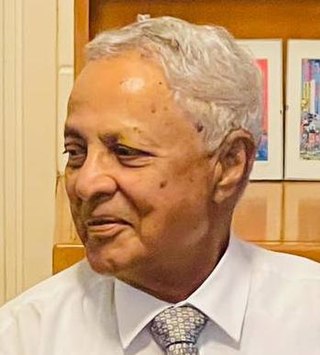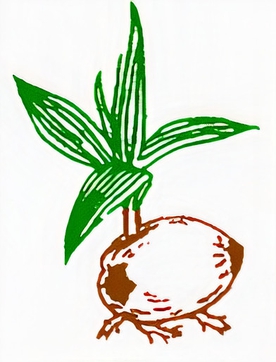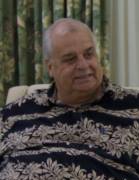
Mahendra Pal Chaudhry is a Fijian politician and the leader of the Fiji Labour Party. Following a historic election in which he defeated the long-time former leader, Sitiveni Rabuka, the former trade union leader became Fiji's first Indo-Fijian Prime Minister on 19 May 1999, but exactly one year later, on 19 May 2000 he and most of his Cabinet were taken hostage by coup leader George Speight, in the Fiji coup of 2000. Unable to exercise his duties, he and his ministers were sacked by President Ratu Sir Kamisese Mara on 27 May; Mara intended to assume emergency powers himself but was himself deposed by the military leader, Commodore Frank Bainimarama.

The Fiji Labour Party, also known as Fiji Labour, is a political party in Fiji. Most of its support is from the Indo-Fijian community, although it is officially multiracial and its first leader was an indigenous Fijian, Dr. Timoci Bavadra. The party has been elected to power twice, with Timoci Bavadra and Mahendra Chaudhry becoming prime minister in 1987 and 1999 respectively. On both occasions, the resulting government was rapidly overthrown by a coup.

The United Fiji Party was a political party in Fiji. It was founded in 2001 by Prime Minister Laisenia Qarase as a power base; it absorbed most of the Christian Democratic Alliance and other conservative groups, and its endorsement by the Great Council of Chiefs (Bose Levu Vakaturaga) caused it to be widely seen as the successor to the Alliance Party, the former ruling party that had dominated Fijian politics from the 1960s to the 1980s. It drew its support mainly from indigenous Fijiians.

Tupeni Lebaivalu Baba is a Fijian academic, politician, and former Cabinet Minister. A founding member of the Fiji Labour Party, he served as a Cabinet Minister in the government of Timoci Bavadra until removed from office by the 1987 Fijian coups d'état, and then as Deputy Prime Minister of Fiji in the government of Mahendra Chaudhry until removed from office by the 2000 Fijian coup d'état. After splitting with Choudhry in the wake of the coup, he founded the New Labour Unity Party to contest the 2001 election, but failed to win a seat in Parliament. He unsuccessfully attempting to re-enter politics at the 2006 election under the banner of the Soqosoqo Duavata ni Lewenivanua, and again at the 2014 election as part of the Social Democratic Liberal Party.

General elections were held in Fiji in August and September 2001. The Soqosoqo Duavata ni Lewenivanua party won 18 of the 23 seats reserved for ethnic Fijians and one of three "general electorates" set aside for Fiji's European, Chinese, and other minorities. It also won 13 of the 25 "open electorates," so-called because they are open to candidates of any race and are elected by universal suffrage. The remaining five ethnic Fijian seats, and one open electorate, were won by the Conservative Alliance, one of whom was George Speight who had led the putsch against the lawful government the year before. Chaudhry's Labour Party won all 19 Indo-Fijian seats and eight open electorates. The New Labour Unity Party, formed by defectors from the FLP, won one general electorate and one open electorate. The three remaining seats were won by minor parties and independent candidates.

The National Federation Party is a Fijian political party founded by A.D. Patel in November 1968, as a merger of the Federation Party and the National Democratic Party. Though it claims to represent all Fiji Islanders, it is supported, in practice, almost exclusively by Indo-Fijians whose ancestors had come to Fiji between 1879 and 1916, mostly as indentured labourers. However, in the 2018 general election, the party recorded a considerable change in its support base due to the inclusion of more indigenous Fijian candidates.

The Conservative Alliance was a right-wing political party in Fiji, and a member of the ruling coalition government. It was commonly known as the CAMV, a combination of the initials of its English and Fijian names. At its annual general meeting on 17 February 2006, the party voted to dissolve itself and merge with its coalition partner, the Soqosoqo Duavata ni Lewenivanua (SDL). The President of the party at the time of its dissolution was Ratu Tanoa Cakobau, a Bauan chief, while Ratu Josefa Dimuri served as General Secretary. For legal reasons, Parliamentary members of the disbanded party maintained a separate caucus in the House of Representatives, under the leadership of Ratu Naiqama Lalabalavu, until the end of the parliamentary term, on 27 March 2006.

The National Alliance Party of Fiji (NAPF) was a Fijian political party. It was formally registered on 18 January 2005 by Ratu Epeli Ganilau, as the claimed successor to the defunct Alliance Party, which ruled Fiji from 1967 to 1987 under the leadership of the late Ratu Sir Kamisese Mara, Ganilau's father-in-law. Others involved with the party included university lecturer Meli Waqa as party secretary, and Manu Korovulavula as treasurer. The Deputy Leader was Hirdesh Sharma. The party was launched publicly at a mass rally in Suva on 8 April 2005.

The Fijian Association Party (FAP) is a former political party in Fiji. It played a significant role in Fijian politics throughout the 1990s, but lost all of its seats in the House of Representatives in the parliamentary election of 2001.

The Soqosoqo ni Vakavulewa ni Taukei (SVT), occasionally known in English as Fijian Political Party, was a party which dominated the politics of Fiji in the 1990s and was the mainstay of coalition governments from 1992 to 1999.

Mick Malcolm Millis Beddoes, widely known as Mick Beddoes, is a Fijian politician and businessman from Nadi, who led the United Peoples Party from 2000 to 2013, and was the Leader of the Opposition at the time of the military coup of 5 December 2006. He was also the Chief Executive of the World Netball Company, and was Chairman of the organising committee for the 2007 World Netball Championships, but announced his resignation on 24 January 2006, citing a possible conflict of interest, as his company would be working as a ground operator during the championships.

The Grand Coalition for Fiji, formerly known as the Grand Coalition Initiative Group, was a coalition of five predominantly indigenous Fijian political parties in Fiji, forged for the purpose of contesting the general election scheduled for 2006 under a single umbrella and forming a coalition government subsequently. Efforts to unite the ethnic Fijian parties were in part a response to their electoral defeat in 1999, when they had been split, enabling the Indian-backed FLP to win a landslide victory. Nevertheless, Tomasi Vakatora, the chairman of the Grand Coalition, publicly stated in February 2006 that it was open to sharing preferences with the predominantly Indian parties. By the time of the election, however, the coalition was virtually defunct.

General elections were held in Fiji between 6 and 13 May 2006.

The Party of National Unity was a Fijian political party founded by Ratu Sairusi Nagagavoka in 1998; by the time of the military coup of 2006, Nagagavoka remained the President of the party. A well-known member of the party was Apisai Tora. Presenting itself as a multiracial party representing the interests of Ba Province in particular, it formed part of the Fiji Labour Party-led People's Coalition in the general election of 1999, and won four seats in the House of Representatives. It lost all of its seats in the following election, in 2001, but party stalwart Ponipate Lesavua was appointed to the Senate as one of 8 nominees of Opposition Leader Mahendra Chaudhry.

The crisis that saw a virtual breakdown in relations between Fiji's government and military forces in late 2005 and early 2006, generated fears of civil unrest and even a military coup. The dismissing of Lieutenant Colonel Jone Baledrokadroka, the Acting Land Force Commander, for alleged insubordination on 12 January 2006 was coupled with unusual deployments of troops and naval vessels. Both before and after it was resolved on 16 January with a truce brokered by Acting President Ratu Joni Madraiwiwi, the crisis generated a great deal of comment.

Charan Jeath Singh is an Indo-Fijian businessman, politician, and Cabinet Minister. From 1992 to 2005 he was Mayor of Labasa. He is the founder of the CJS Group of companies.
Ponipate Tawase Lesavua was a Fijian politician, who led the now-defunct Party of National Unity, which drew most of its support from Ba Province in the West of the country. The former Police officer, who spent 20 years in the Criminal Investigation Department, was an outspoken politician, who championed what he saw as the interests of western Fiji. He has endorsed calls for a return to the former system of customary justice, in force during the colonial era, under which convicted offenders would be returned to their villages not only for punishment but also for counselling and correction, according to the Fiji Times.

The Social Democratic Liberal Party (SODELPA) is a Fijian political party. The party was formed in January 2013 after the dissolution of the Soqosoqo Duavata ni Lewenivanua. The party currently has no party leader.

General elections were held in Fiji on 14 December 2022 to elect the 55 members of Parliament. The elections took place following the passage of controversial electoral amendments.









